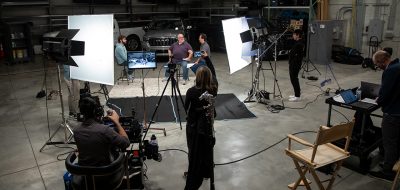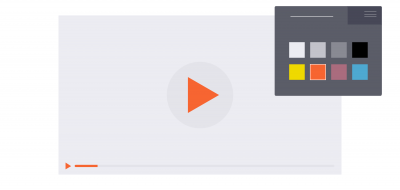“The rise of SVoD led some observers to draft the TV channel’s obituary. Yet linear content delivery is alive and well.” — Rowan de Pomerai, The DPP
Linear programming is making a comeback, and it’s all thanks to cloud playout. Brightcove teamed up with The DPP, who interviewed sports organizations, broadcasters, and publishers on how they’re using cloud playout to launch and manage linear channels.
WHAT IS CLOUD PLAYOUT?
Cloud playout, or broadcasting from the cloud, creates channels and schedules of programming in a very similar viewer experience to traditional television channels. The difference is that these channels access the growing online audience, enable workflows in the cloud, and – in contrast to livestreaming – can offer the ability to switch between live and on-demand content during the stream. The programming on these channels is broadcast like traditional media on web apps, mobile apps, livestreams, and social channels.
Though traditional linear channels have been losing audiences to the convenience of on-demand streaming, they’re capturing a share of the online audience and revenue through cloud playout. Within the media industry, there are three key changes that are driving this rise in online linear viewing.
- The growth of connected TV (CTV). The lean-back experience with longer viewing times is ideal for channels and linear content. Both passive and active viewing suit channels with AVoD (advertising-based video on demand) and SVoD (subscription video on demand) monetization.
- The rise of Free Ad-supported Streaming TV (FAST). The growing CTV audience includes a growing acceptance of advertising as a monetization model. The ad addressability of CTV means FAST can command higher CPMs and generate healthy revenues.
- Event-based coverage. Recent events have expanded audience preferences for streaming event-based content. Creating experiences without needing a large pay-per-view infrastructure has opened up opportunities for engaging audiences with time-bound experiences.
Traditional broadcasting was the standard model for decades, and cloud playout is the tool that can bring that successful model to eager online audiences. In fact, cloud playout has the potential to expand the reach of traditional broadcasting farther than ever due to its accessibility.
WHO CAN USE CLOUD PLAYOUT?
In the past, broadcast-grade channels and programming needed lots of expensive hardware and a team of specialists. Channels only gained a return if they ran for long hours over several years, which meant only large companies could operate channels. Cloud playout can create and manage channels with all the benefits of broadcast programming but without the operating expense.
For example, cloud infrastructure can be scaled up as well as down. Channels and viewing experiences can be created for smaller audiences but also for time-bound events. Without the high startup costs, pop-up channels and event-based streams are viable.
Similarly, aside from the heavy investment of promotion and content, the lower cost of cloud-based channels combined with reduced operational and technical complexity means that smaller organizations can compete. It also allows larger companies to become more agile in trialing new services with new audiences and in new geographies.
The market for cloud-based channels is also increasing because the COVID-19 pandemic accelerated the adoption of digital in many areas, including streaming experiences. More audiences across most demographics and interests are now interested in streaming services. Even niche audiences may now have reached the critical mass to support a linear experience.
HOW TO BUILD CLOUD PLAYOUT CHANNELS
There are many ways to build and operate cloud playout, from SaaS service providers to fully in-house solutions. Team skillsets and internal appetite for build and maintenance should be reviewed before deciding how much to handle in-house.
Though building, launching, and promoting a linear streaming event or channel has become much simpler in the cloud, there are a few things to consider.
Migrating content libraries to the cloud or from legacy systems can be difficult. Mapping out the content that will add value to a linear channel might help prioritize the migration and break up a monolithic challenge into milestones.
Legacies of past investments can also mean slow cloud deployments. Although a purely cloud deployment would give the most benefit, most organizations will operate with existing hardware. Deciding when to retire legacy systems and hardware has a direct cost but also an opportunity cost.
By employing digital development and design principles and skillsets, teams and operations can become more efficient and allow more releases to be shipped more often.
HOW TO MAINTAIN THE CLOUD PLAYOUT EXPERIENCE
Cloud playout brings back much of what made the linear experience so successful. But with the linear experience comes higher expectations. For example, if a key piece of live content suffers from an outage, the experience is ruined. Cloud playout offers several advantages that mitigate these risks and ensure a seamless viewing experience.
SaaS and cloud-based services can have better reliability and redundancy, depending on the service architecture. In the worst-case scenario, automatic failover to another virtual server is faster disaster recovery than changing hardware.
Cloud playout also allows the editorial team to plan and schedule content in advance. This can reduce the headcount needed for managing the live operation and help companies focus on delivering the best viewing experience.
Remote work used to be impossible with a traditional studio and hardware setup. But cloud playout gives teams the flexibility to work remotely, providing companies an invaluable contingency plan.
Cloud playout offers incredible opportunity and flexibility to revitalize traditional linear programming in an on-demand digital age. But switching to the cloud is an investment that requires experienced partners. Several SaaS solutions are available, like Brightcove Cloud Playout, and the right one should take the complexity out of launching a linear viewing experience.




